ITECH5500: Cloud Based ERP Benefits and Challenges Research Proposal
VerifiedAdded on 2022/10/13
|15
|3944
|7
Report
AI Summary
This research proposal investigates the benefits and challenges of cloud-based ERP systems. It begins with an abstract summarizing the study's focus on the advantages organizations can gain by moving their ERP software to the cloud, while acknowledging concerns like privacy and implementation failures. The proposal includes a literature review examining existing research on cloud ERP, followed by a detailed methodology section outlining the research methods, including interviews and focus groups, sampling strategies, and data analysis techniques. The study also addresses ethical considerations and concludes with a summary of findings. The introduction provides background on cloud computing and ERP, discussing the shift towards Software as a Service (SaaS) models and the potential for cost savings, scalability, and improved global accessibility. However, it also highlights key challenges, such as security, vendor lock-in, and customization limitations. The proposal aims to analyze the suitability of cloud ERP compared to conventional ERP systems, identifying the merits and demerits of the cloud-based approach. The literature review covers the role of ERP systems in business, their ability to integrate core business functions, and the challenges of implementation, including flexibility and customization. The methodology section outlines a qualitative approach using interviews and focus groups to gather data and analyze themes such as security, performance, and scalability.

Cloud Based ERP 1
Benefits and Challenges Of Cloud Based ERP: Research Proposal
My Name
Course Title
Professor name
Date
Benefits and Challenges Of Cloud Based ERP: Research Proposal
My Name
Course Title
Professor name
Date
Paraphrase This Document
Need a fresh take? Get an instant paraphrase of this document with our AI Paraphraser
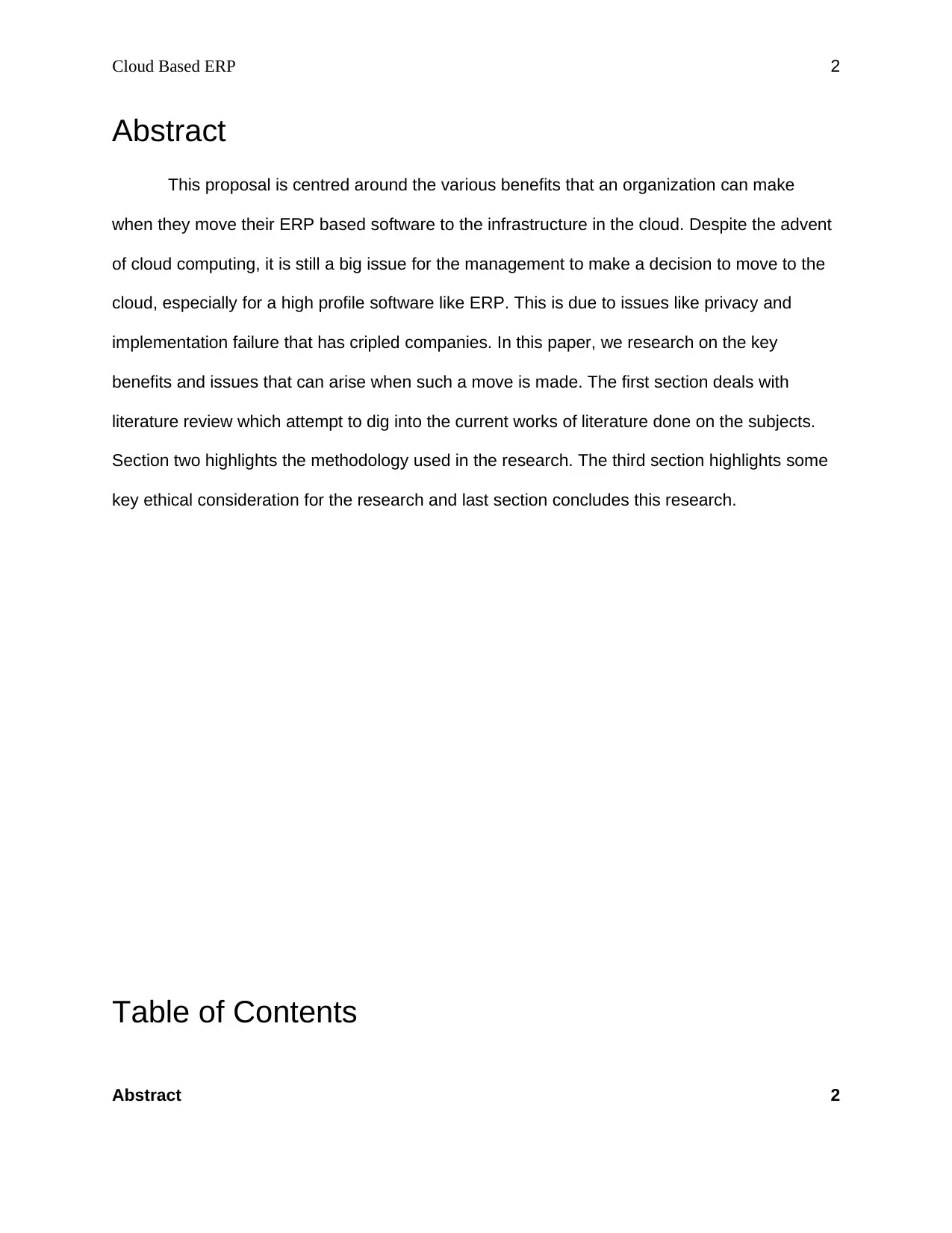
Cloud Based ERP 2
Abstract
This proposal is centred around the various benefits that an organization can make
when they move their ERP based software to the infrastructure in the cloud. Despite the advent
of cloud computing, it is still a big issue for the management to make a decision to move to the
cloud, especially for a high profile software like ERP. This is due to issues like privacy and
implementation failure that has cripled companies. In this paper, we research on the key
benefits and issues that can arise when such a move is made. The first section deals with
literature review which attempt to dig into the current works of literature done on the subjects.
Section two highlights the methodology used in the research. The third section highlights some
key ethical consideration for the research and last section concludes this research.
Table of Contents
Abstract 2
Abstract
This proposal is centred around the various benefits that an organization can make
when they move their ERP based software to the infrastructure in the cloud. Despite the advent
of cloud computing, it is still a big issue for the management to make a decision to move to the
cloud, especially for a high profile software like ERP. This is due to issues like privacy and
implementation failure that has cripled companies. In this paper, we research on the key
benefits and issues that can arise when such a move is made. The first section deals with
literature review which attempt to dig into the current works of literature done on the subjects.
Section two highlights the methodology used in the research. The third section highlights some
key ethical consideration for the research and last section concludes this research.
Table of Contents
Abstract 2
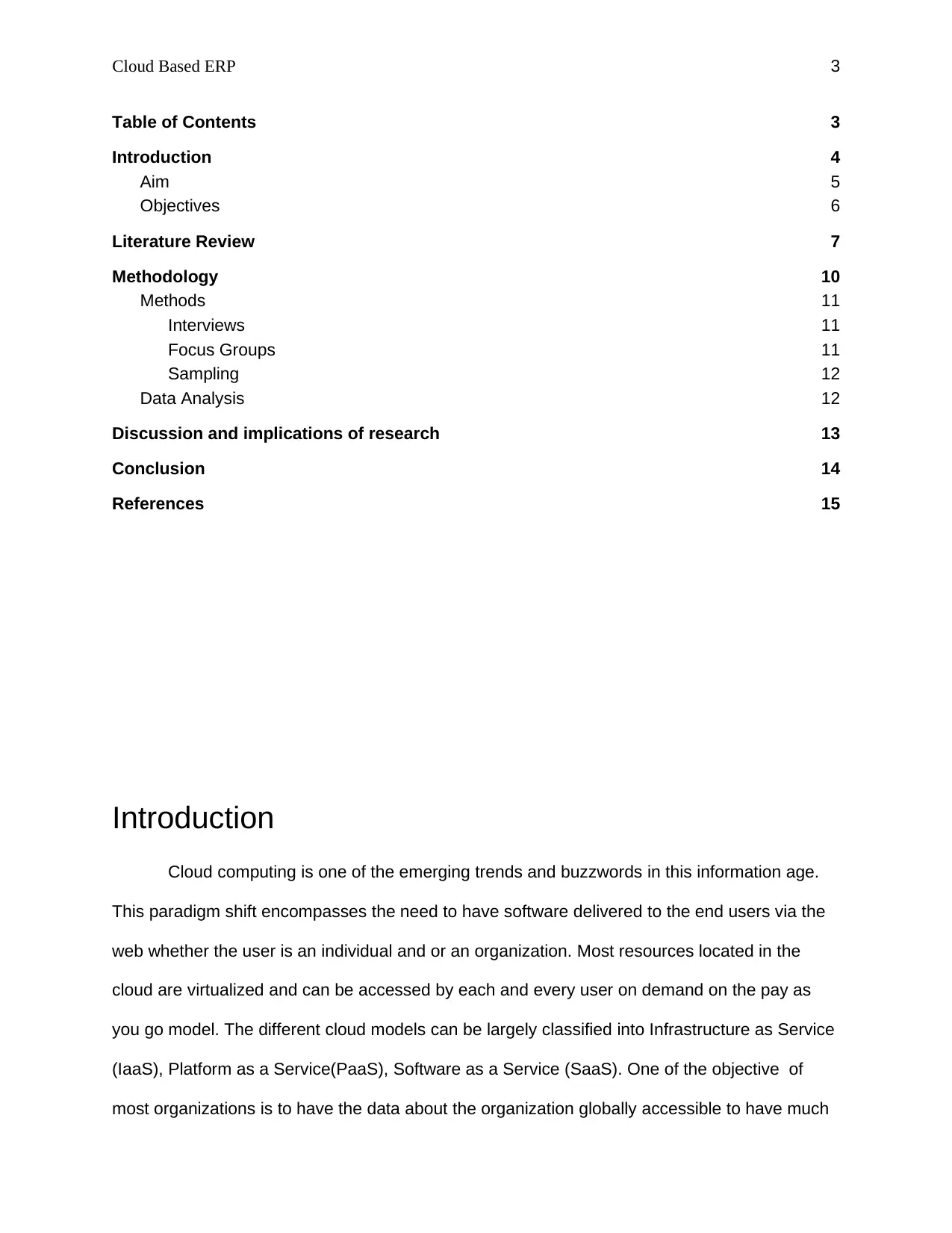
Cloud Based ERP 3
Table of Contents 3
Introduction 4
Aim 5
Objectives 6
Literature Review 7
Methodology 10
Methods 11
Interviews 11
Focus Groups 11
Sampling 12
Data Analysis 12
Discussion and implications of research 13
Conclusion 14
References 15
Introduction
Cloud computing is one of the emerging trends and buzzwords in this information age.
This paradigm shift encompasses the need to have software delivered to the end users via the
web whether the user is an individual and or an organization. Most resources located in the
cloud are virtualized and can be accessed by each and every user on demand on the pay as
you go model. The different cloud models can be largely classified into Infrastructure as Service
(IaaS), Platform as a Service(PaaS), Software as a Service (SaaS). One of the objective of
most organizations is to have the data about the organization globally accessible to have much
Table of Contents 3
Introduction 4
Aim 5
Objectives 6
Literature Review 7
Methodology 10
Methods 11
Interviews 11
Focus Groups 11
Sampling 12
Data Analysis 12
Discussion and implications of research 13
Conclusion 14
References 15
Introduction
Cloud computing is one of the emerging trends and buzzwords in this information age.
This paradigm shift encompasses the need to have software delivered to the end users via the
web whether the user is an individual and or an organization. Most resources located in the
cloud are virtualized and can be accessed by each and every user on demand on the pay as
you go model. The different cloud models can be largely classified into Infrastructure as Service
(IaaS), Platform as a Service(PaaS), Software as a Service (SaaS). One of the objective of
most organizations is to have the data about the organization globally accessible to have much
⊘ This is a preview!⊘
Do you want full access?
Subscribe today to unlock all pages.

Trusted by 1+ million students worldwide
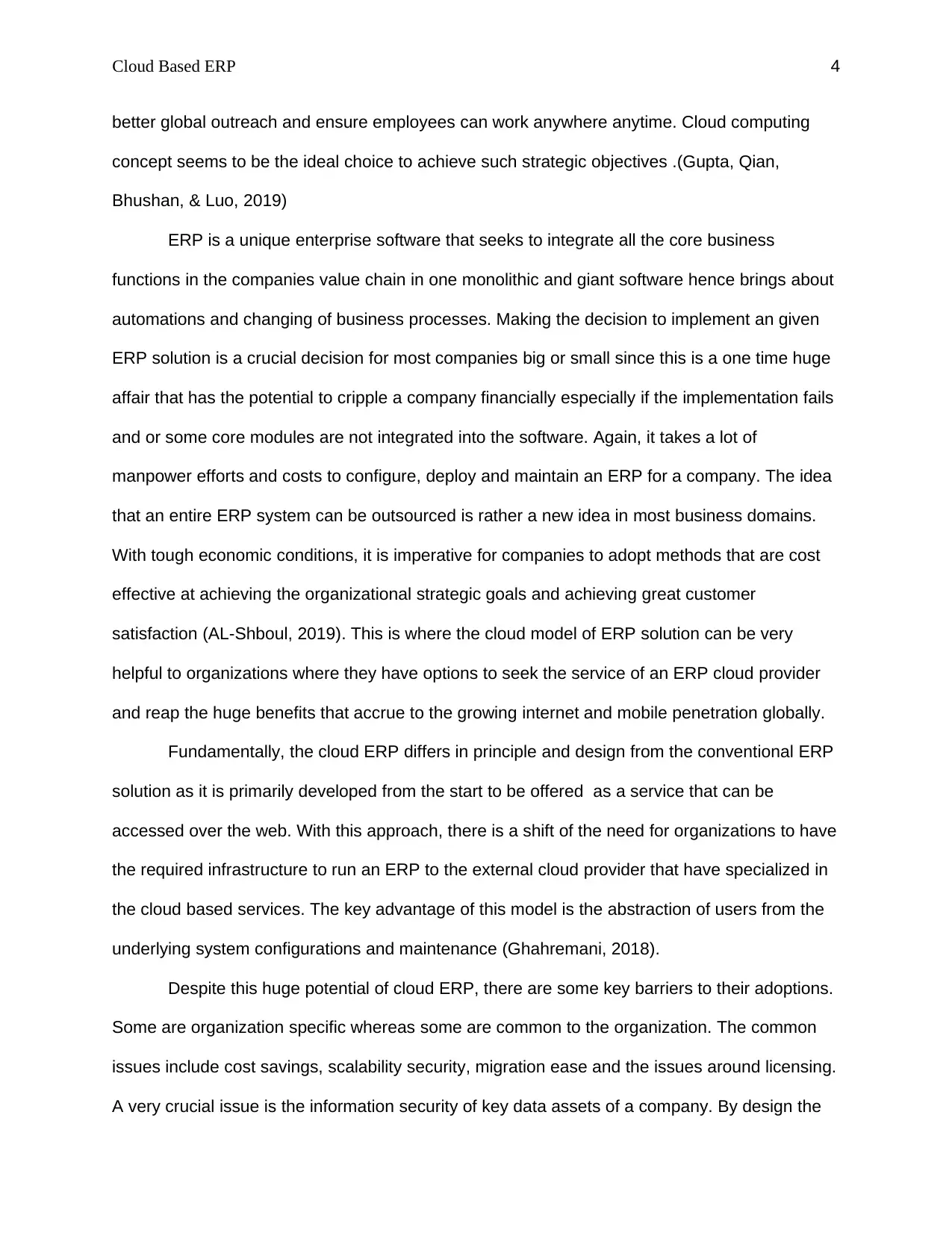
Cloud Based ERP 4
better global outreach and ensure employees can work anywhere anytime. Cloud computing
concept seems to be the ideal choice to achieve such strategic objectives .(Gupta, Qian,
Bhushan, & Luo, 2019)
ERP is a unique enterprise software that seeks to integrate all the core business
functions in the companies value chain in one monolithic and giant software hence brings about
automations and changing of business processes. Making the decision to implement an given
ERP solution is a crucial decision for most companies big or small since this is a one time huge
affair that has the potential to cripple a company financially especially if the implementation fails
and or some core modules are not integrated into the software. Again, it takes a lot of
manpower efforts and costs to configure, deploy and maintain an ERP for a company. The idea
that an entire ERP system can be outsourced is rather a new idea in most business domains.
With tough economic conditions, it is imperative for companies to adopt methods that are cost
effective at achieving the organizational strategic goals and achieving great customer
satisfaction (AL-Shboul, 2019). This is where the cloud model of ERP solution can be very
helpful to organizations where they have options to seek the service of an ERP cloud provider
and reap the huge benefits that accrue to the growing internet and mobile penetration globally.
Fundamentally, the cloud ERP differs in principle and design from the conventional ERP
solution as it is primarily developed from the start to be offered as a service that can be
accessed over the web. With this approach, there is a shift of the need for organizations to have
the required infrastructure to run an ERP to the external cloud provider that have specialized in
the cloud based services. The key advantage of this model is the abstraction of users from the
underlying system configurations and maintenance (Ghahremani, 2018).
Despite this huge potential of cloud ERP, there are some key barriers to their adoptions.
Some are organization specific whereas some are common to the organization. The common
issues include cost savings, scalability security, migration ease and the issues around licensing.
A very crucial issue is the information security of key data assets of a company. By design the
better global outreach and ensure employees can work anywhere anytime. Cloud computing
concept seems to be the ideal choice to achieve such strategic objectives .(Gupta, Qian,
Bhushan, & Luo, 2019)
ERP is a unique enterprise software that seeks to integrate all the core business
functions in the companies value chain in one monolithic and giant software hence brings about
automations and changing of business processes. Making the decision to implement an given
ERP solution is a crucial decision for most companies big or small since this is a one time huge
affair that has the potential to cripple a company financially especially if the implementation fails
and or some core modules are not integrated into the software. Again, it takes a lot of
manpower efforts and costs to configure, deploy and maintain an ERP for a company. The idea
that an entire ERP system can be outsourced is rather a new idea in most business domains.
With tough economic conditions, it is imperative for companies to adopt methods that are cost
effective at achieving the organizational strategic goals and achieving great customer
satisfaction (AL-Shboul, 2019). This is where the cloud model of ERP solution can be very
helpful to organizations where they have options to seek the service of an ERP cloud provider
and reap the huge benefits that accrue to the growing internet and mobile penetration globally.
Fundamentally, the cloud ERP differs in principle and design from the conventional ERP
solution as it is primarily developed from the start to be offered as a service that can be
accessed over the web. With this approach, there is a shift of the need for organizations to have
the required infrastructure to run an ERP to the external cloud provider that have specialized in
the cloud based services. The key advantage of this model is the abstraction of users from the
underlying system configurations and maintenance (Ghahremani, 2018).
Despite this huge potential of cloud ERP, there are some key barriers to their adoptions.
Some are organization specific whereas some are common to the organization. The common
issues include cost savings, scalability security, migration ease and the issues around licensing.
A very crucial issue is the information security of key data assets of a company. By design the
Paraphrase This Document
Need a fresh take? Get an instant paraphrase of this document with our AI Paraphraser
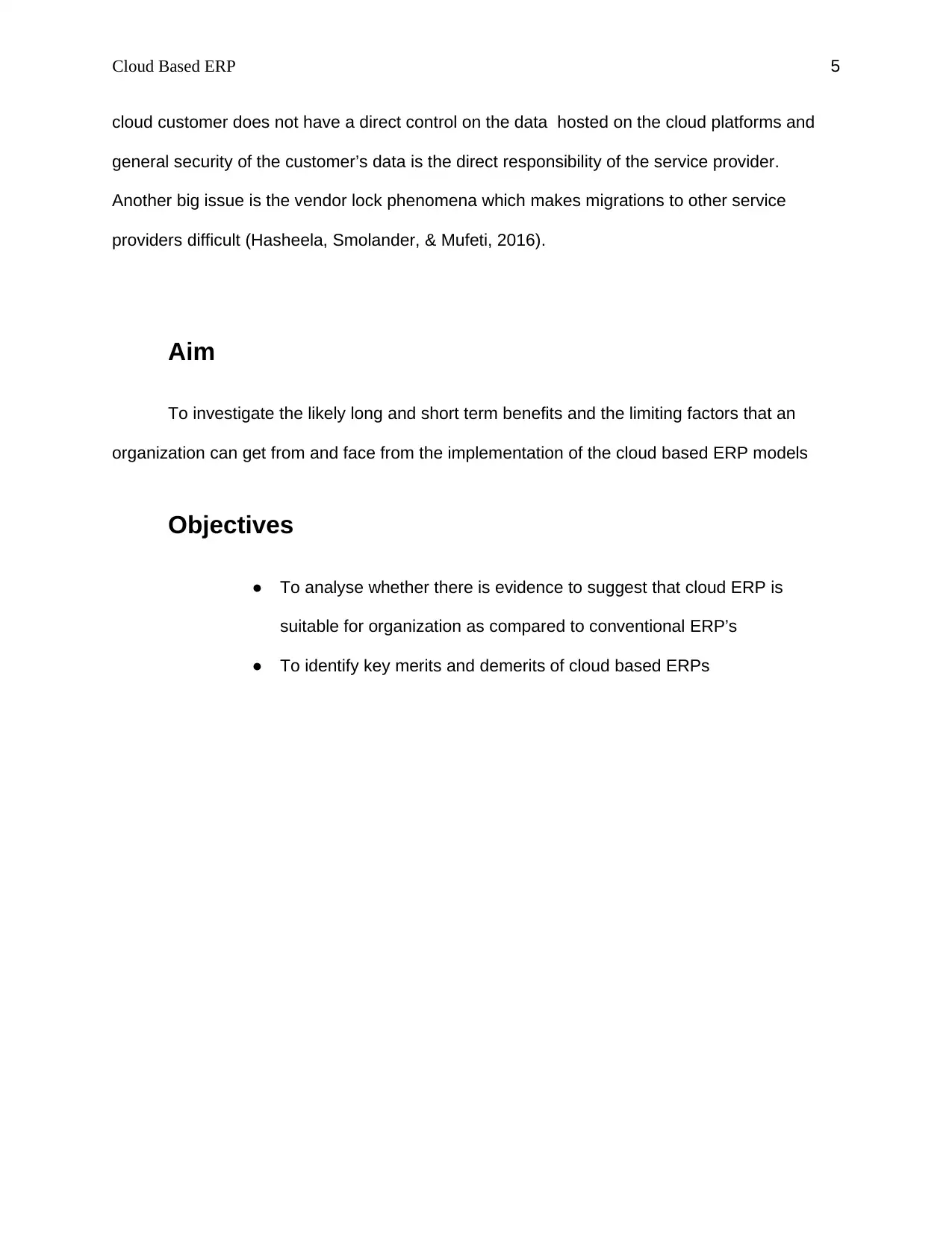
Cloud Based ERP 5
cloud customer does not have a direct control on the data hosted on the cloud platforms and
general security of the customer’s data is the direct responsibility of the service provider.
Another big issue is the vendor lock phenomena which makes migrations to other service
providers difficult (Hasheela, Smolander, & Mufeti, 2016).
Aim
To investigate the likely long and short term benefits and the limiting factors that an
organization can get from and face from the implementation of the cloud based ERP models
Objectives
● To analyse whether there is evidence to suggest that cloud ERP is
suitable for organization as compared to conventional ERP’s
● To identify key merits and demerits of cloud based ERPs
cloud customer does not have a direct control on the data hosted on the cloud platforms and
general security of the customer’s data is the direct responsibility of the service provider.
Another big issue is the vendor lock phenomena which makes migrations to other service
providers difficult (Hasheela, Smolander, & Mufeti, 2016).
Aim
To investigate the likely long and short term benefits and the limiting factors that an
organization can get from and face from the implementation of the cloud based ERP models
Objectives
● To analyse whether there is evidence to suggest that cloud ERP is
suitable for organization as compared to conventional ERP’s
● To identify key merits and demerits of cloud based ERPs
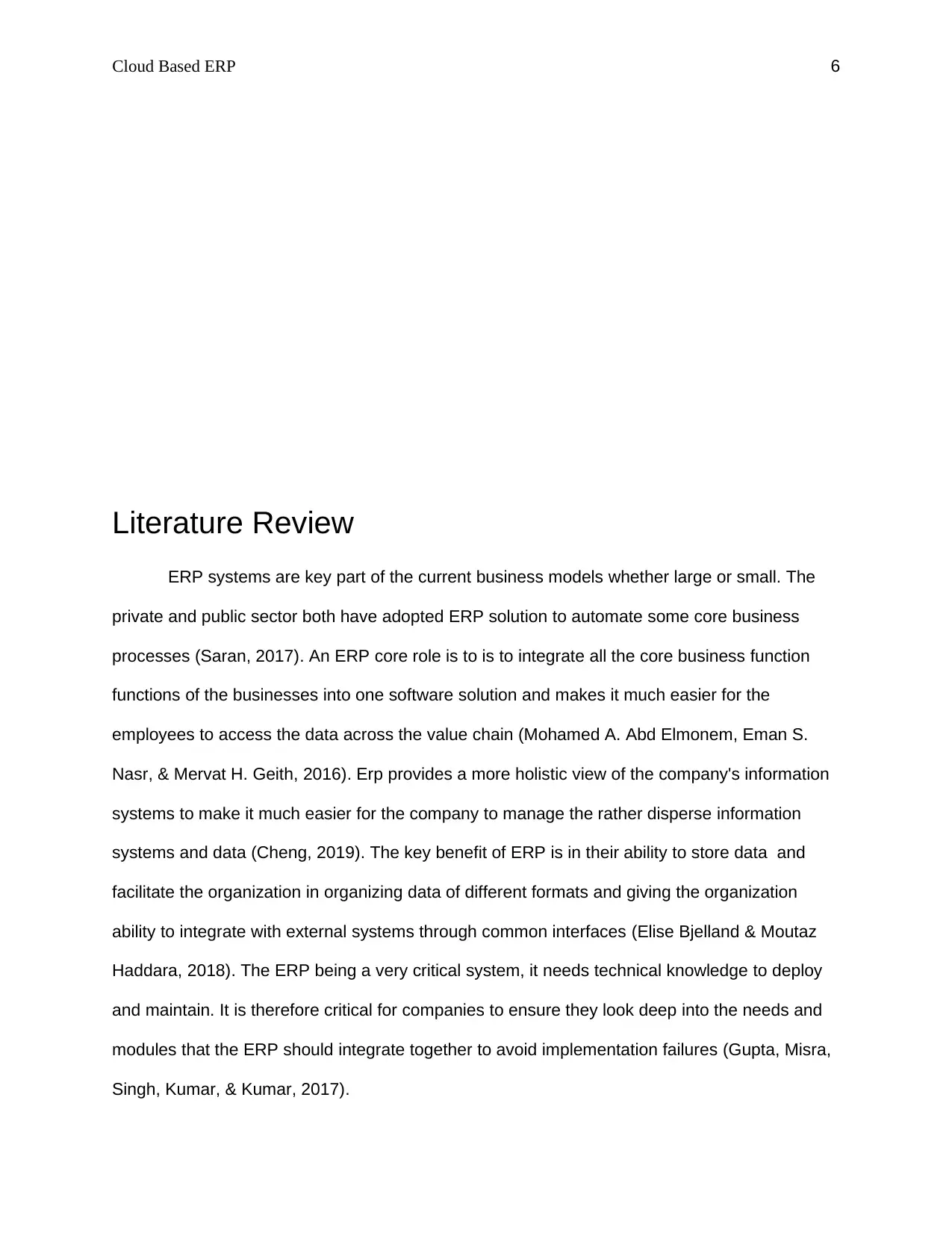
Cloud Based ERP 6
Literature Review
ERP systems are key part of the current business models whether large or small. The
private and public sector both have adopted ERP solution to automate some core business
processes (Saran, 2017). An ERP core role is to is to integrate all the core business function
functions of the businesses into one software solution and makes it much easier for the
employees to access the data across the value chain (Mohamed A. Abd Elmonem, Eman S.
Nasr, & Mervat H. Geith, 2016). Erp provides a more holistic view of the company's information
systems to make it much easier for the company to manage the rather disperse information
systems and data (Cheng, 2019). The key benefit of ERP is in their ability to store data and
facilitate the organization in organizing data of different formats and giving the organization
ability to integrate with external systems through common interfaces (Elise Bjelland & Moutaz
Haddara, 2018). The ERP being a very critical system, it needs technical knowledge to deploy
and maintain. It is therefore critical for companies to ensure they look deep into the needs and
modules that the ERP should integrate together to avoid implementation failures (Gupta, Misra,
Singh, Kumar, & Kumar, 2017).
Literature Review
ERP systems are key part of the current business models whether large or small. The
private and public sector both have adopted ERP solution to automate some core business
processes (Saran, 2017). An ERP core role is to is to integrate all the core business function
functions of the businesses into one software solution and makes it much easier for the
employees to access the data across the value chain (Mohamed A. Abd Elmonem, Eman S.
Nasr, & Mervat H. Geith, 2016). Erp provides a more holistic view of the company's information
systems to make it much easier for the company to manage the rather disperse information
systems and data (Cheng, 2019). The key benefit of ERP is in their ability to store data and
facilitate the organization in organizing data of different formats and giving the organization
ability to integrate with external systems through common interfaces (Elise Bjelland & Moutaz
Haddara, 2018). The ERP being a very critical system, it needs technical knowledge to deploy
and maintain. It is therefore critical for companies to ensure they look deep into the needs and
modules that the ERP should integrate together to avoid implementation failures (Gupta, Misra,
Singh, Kumar, & Kumar, 2017).
⊘ This is a preview!⊘
Do you want full access?
Subscribe today to unlock all pages.

Trusted by 1+ million students worldwide
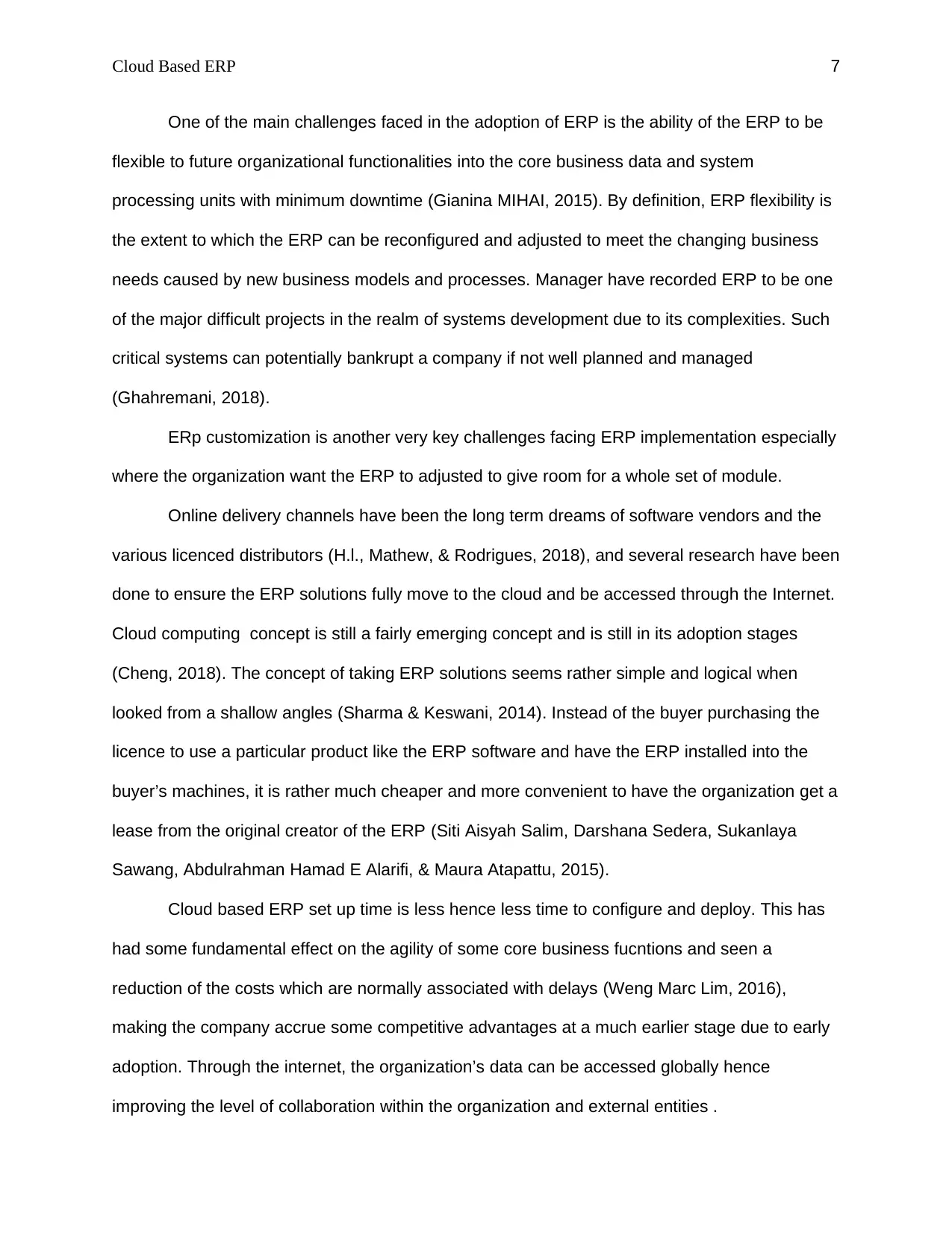
Cloud Based ERP 7
One of the main challenges faced in the adoption of ERP is the ability of the ERP to be
flexible to future organizational functionalities into the core business data and system
processing units with minimum downtime (Gianina MIHAI, 2015). By definition, ERP flexibility is
the extent to which the ERP can be reconfigured and adjusted to meet the changing business
needs caused by new business models and processes. Manager have recorded ERP to be one
of the major difficult projects in the realm of systems development due to its complexities. Such
critical systems can potentially bankrupt a company if not well planned and managed
(Ghahremani, 2018).
ERp customization is another very key challenges facing ERP implementation especially
where the organization want the ERP to adjusted to give room for a whole set of module.
Online delivery channels have been the long term dreams of software vendors and the
various licenced distributors (H.l., Mathew, & Rodrigues, 2018), and several research have been
done to ensure the ERP solutions fully move to the cloud and be accessed through the Internet.
Cloud computing concept is still a fairly emerging concept and is still in its adoption stages
(Cheng, 2018). The concept of taking ERP solutions seems rather simple and logical when
looked from a shallow angles (Sharma & Keswani, 2014). Instead of the buyer purchasing the
licence to use a particular product like the ERP software and have the ERP installed into the
buyer’s machines, it is rather much cheaper and more convenient to have the organization get a
lease from the original creator of the ERP (Siti Aisyah Salim, Darshana Sedera, Sukanlaya
Sawang, Abdulrahman Hamad E Alarifi, & Maura Atapattu, 2015).
Cloud based ERP set up time is less hence less time to configure and deploy. This has
had some fundamental effect on the agility of some core business fucntions and seen a
reduction of the costs which are normally associated with delays (Weng Marc Lim, 2016),
making the company accrue some competitive advantages at a much earlier stage due to early
adoption. Through the internet, the organization’s data can be accessed globally hence
improving the level of collaboration within the organization and external entities .
One of the main challenges faced in the adoption of ERP is the ability of the ERP to be
flexible to future organizational functionalities into the core business data and system
processing units with minimum downtime (Gianina MIHAI, 2015). By definition, ERP flexibility is
the extent to which the ERP can be reconfigured and adjusted to meet the changing business
needs caused by new business models and processes. Manager have recorded ERP to be one
of the major difficult projects in the realm of systems development due to its complexities. Such
critical systems can potentially bankrupt a company if not well planned and managed
(Ghahremani, 2018).
ERp customization is another very key challenges facing ERP implementation especially
where the organization want the ERP to adjusted to give room for a whole set of module.
Online delivery channels have been the long term dreams of software vendors and the
various licenced distributors (H.l., Mathew, & Rodrigues, 2018), and several research have been
done to ensure the ERP solutions fully move to the cloud and be accessed through the Internet.
Cloud computing concept is still a fairly emerging concept and is still in its adoption stages
(Cheng, 2018). The concept of taking ERP solutions seems rather simple and logical when
looked from a shallow angles (Sharma & Keswani, 2014). Instead of the buyer purchasing the
licence to use a particular product like the ERP software and have the ERP installed into the
buyer’s machines, it is rather much cheaper and more convenient to have the organization get a
lease from the original creator of the ERP (Siti Aisyah Salim, Darshana Sedera, Sukanlaya
Sawang, Abdulrahman Hamad E Alarifi, & Maura Atapattu, 2015).
Cloud based ERP set up time is less hence less time to configure and deploy. This has
had some fundamental effect on the agility of some core business fucntions and seen a
reduction of the costs which are normally associated with delays (Weng Marc Lim, 2016),
making the company accrue some competitive advantages at a much earlier stage due to early
adoption. Through the internet, the organization’s data can be accessed globally hence
improving the level of collaboration within the organization and external entities .
Paraphrase This Document
Need a fresh take? Get an instant paraphrase of this document with our AI Paraphraser
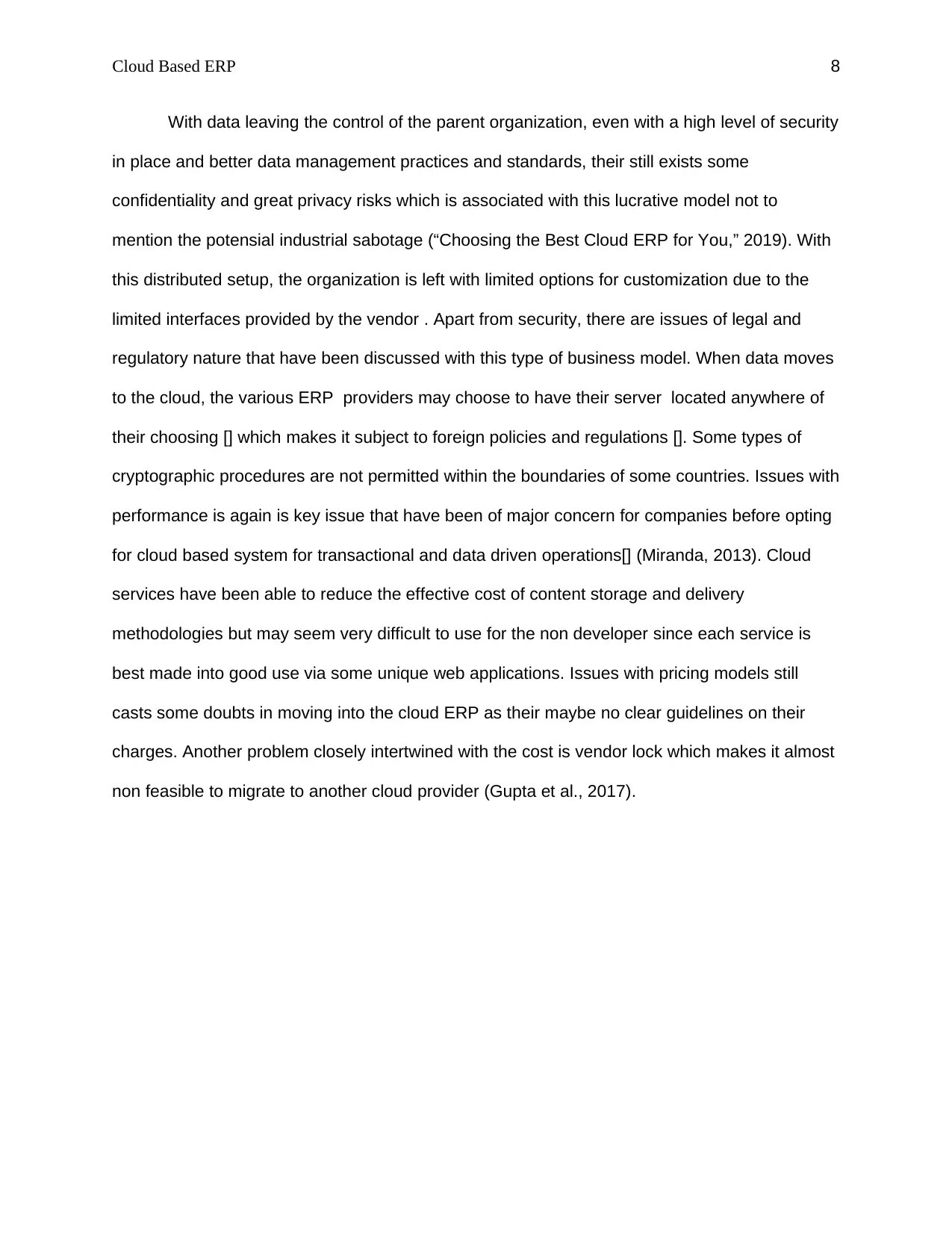
Cloud Based ERP 8
With data leaving the control of the parent organization, even with a high level of security
in place and better data management practices and standards, their still exists some
confidentiality and great privacy risks which is associated with this lucrative model not to
mention the potensial industrial sabotage (“Choosing the Best Cloud ERP for You,” 2019). With
this distributed setup, the organization is left with limited options for customization due to the
limited interfaces provided by the vendor . Apart from security, there are issues of legal and
regulatory nature that have been discussed with this type of business model. When data moves
to the cloud, the various ERP providers may choose to have their server located anywhere of
their choosing [] which makes it subject to foreign policies and regulations []. Some types of
cryptographic procedures are not permitted within the boundaries of some countries. Issues with
performance is again is key issue that have been of major concern for companies before opting
for cloud based system for transactional and data driven operations[] (Miranda, 2013). Cloud
services have been able to reduce the effective cost of content storage and delivery
methodologies but may seem very difficult to use for the non developer since each service is
best made into good use via some unique web applications. Issues with pricing models still
casts some doubts in moving into the cloud ERP as their maybe no clear guidelines on their
charges. Another problem closely intertwined with the cost is vendor lock which makes it almost
non feasible to migrate to another cloud provider (Gupta et al., 2017).
With data leaving the control of the parent organization, even with a high level of security
in place and better data management practices and standards, their still exists some
confidentiality and great privacy risks which is associated with this lucrative model not to
mention the potensial industrial sabotage (“Choosing the Best Cloud ERP for You,” 2019). With
this distributed setup, the organization is left with limited options for customization due to the
limited interfaces provided by the vendor . Apart from security, there are issues of legal and
regulatory nature that have been discussed with this type of business model. When data moves
to the cloud, the various ERP providers may choose to have their server located anywhere of
their choosing [] which makes it subject to foreign policies and regulations []. Some types of
cryptographic procedures are not permitted within the boundaries of some countries. Issues with
performance is again is key issue that have been of major concern for companies before opting
for cloud based system for transactional and data driven operations[] (Miranda, 2013). Cloud
services have been able to reduce the effective cost of content storage and delivery
methodologies but may seem very difficult to use for the non developer since each service is
best made into good use via some unique web applications. Issues with pricing models still
casts some doubts in moving into the cloud ERP as their maybe no clear guidelines on their
charges. Another problem closely intertwined with the cost is vendor lock which makes it almost
non feasible to migrate to another cloud provider (Gupta et al., 2017).
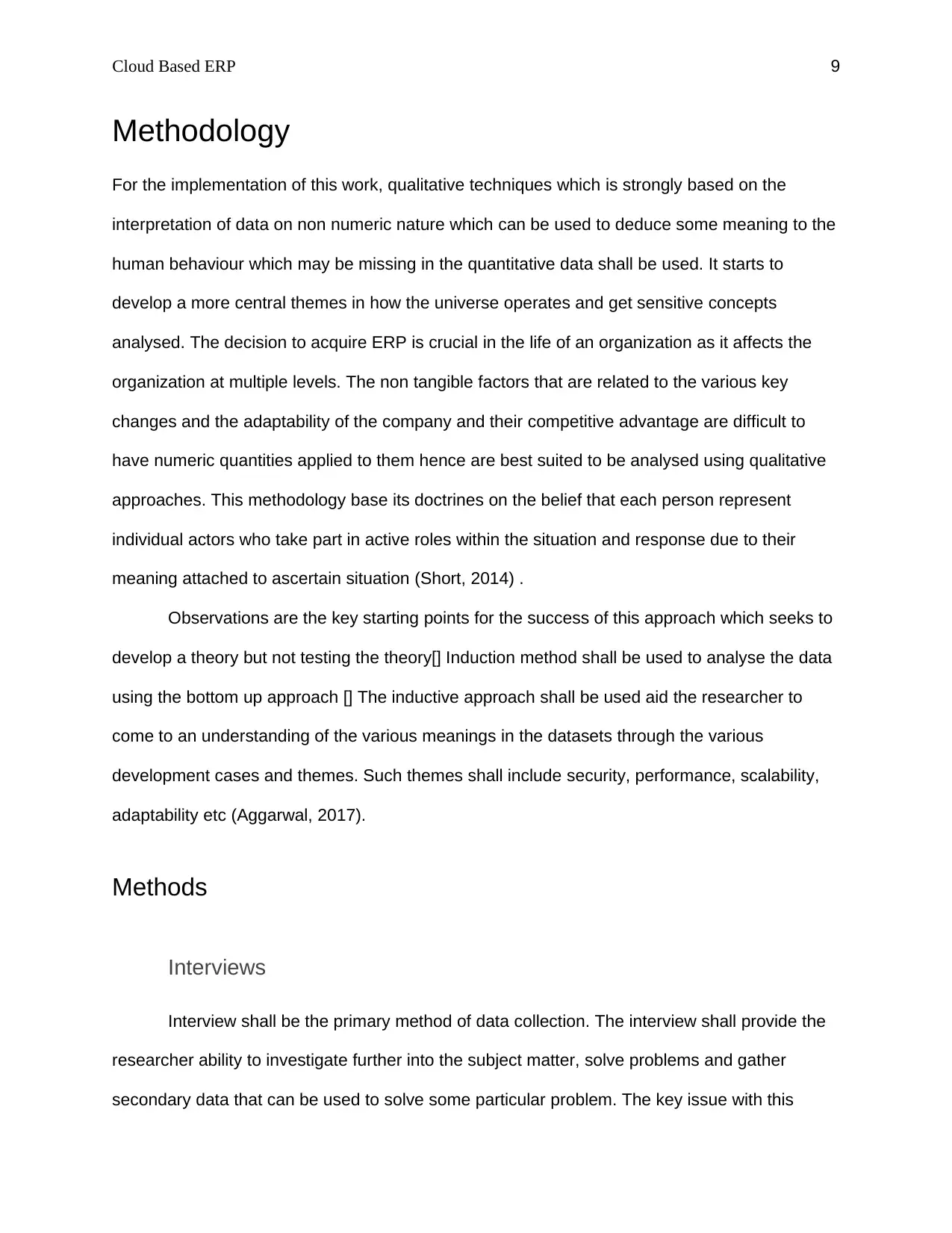
Cloud Based ERP 9
Methodology
For the implementation of this work, qualitative techniques which is strongly based on the
interpretation of data on non numeric nature which can be used to deduce some meaning to the
human behaviour which may be missing in the quantitative data shall be used. It starts to
develop a more central themes in how the universe operates and get sensitive concepts
analysed. The decision to acquire ERP is crucial in the life of an organization as it affects the
organization at multiple levels. The non tangible factors that are related to the various key
changes and the adaptability of the company and their competitive advantage are difficult to
have numeric quantities applied to them hence are best suited to be analysed using qualitative
approaches. This methodology base its doctrines on the belief that each person represent
individual actors who take part in active roles within the situation and response due to their
meaning attached to ascertain situation (Short, 2014) .
Observations are the key starting points for the success of this approach which seeks to
develop a theory but not testing the theory[] Induction method shall be used to analyse the data
using the bottom up approach [] The inductive approach shall be used aid the researcher to
come to an understanding of the various meanings in the datasets through the various
development cases and themes. Such themes shall include security, performance, scalability,
adaptability etc (Aggarwal, 2017).
Methods
Interviews
Interview shall be the primary method of data collection. The interview shall provide the
researcher ability to investigate further into the subject matter, solve problems and gather
secondary data that can be used to solve some particular problem. The key issue with this
Methodology
For the implementation of this work, qualitative techniques which is strongly based on the
interpretation of data on non numeric nature which can be used to deduce some meaning to the
human behaviour which may be missing in the quantitative data shall be used. It starts to
develop a more central themes in how the universe operates and get sensitive concepts
analysed. The decision to acquire ERP is crucial in the life of an organization as it affects the
organization at multiple levels. The non tangible factors that are related to the various key
changes and the adaptability of the company and their competitive advantage are difficult to
have numeric quantities applied to them hence are best suited to be analysed using qualitative
approaches. This methodology base its doctrines on the belief that each person represent
individual actors who take part in active roles within the situation and response due to their
meaning attached to ascertain situation (Short, 2014) .
Observations are the key starting points for the success of this approach which seeks to
develop a theory but not testing the theory[] Induction method shall be used to analyse the data
using the bottom up approach [] The inductive approach shall be used aid the researcher to
come to an understanding of the various meanings in the datasets through the various
development cases and themes. Such themes shall include security, performance, scalability,
adaptability etc (Aggarwal, 2017).
Methods
Interviews
Interview shall be the primary method of data collection. The interview shall provide the
researcher ability to investigate further into the subject matter, solve problems and gather
secondary data that can be used to solve some particular problem. The key issue with this
⊘ This is a preview!⊘
Do you want full access?
Subscribe today to unlock all pages.

Trusted by 1+ million students worldwide
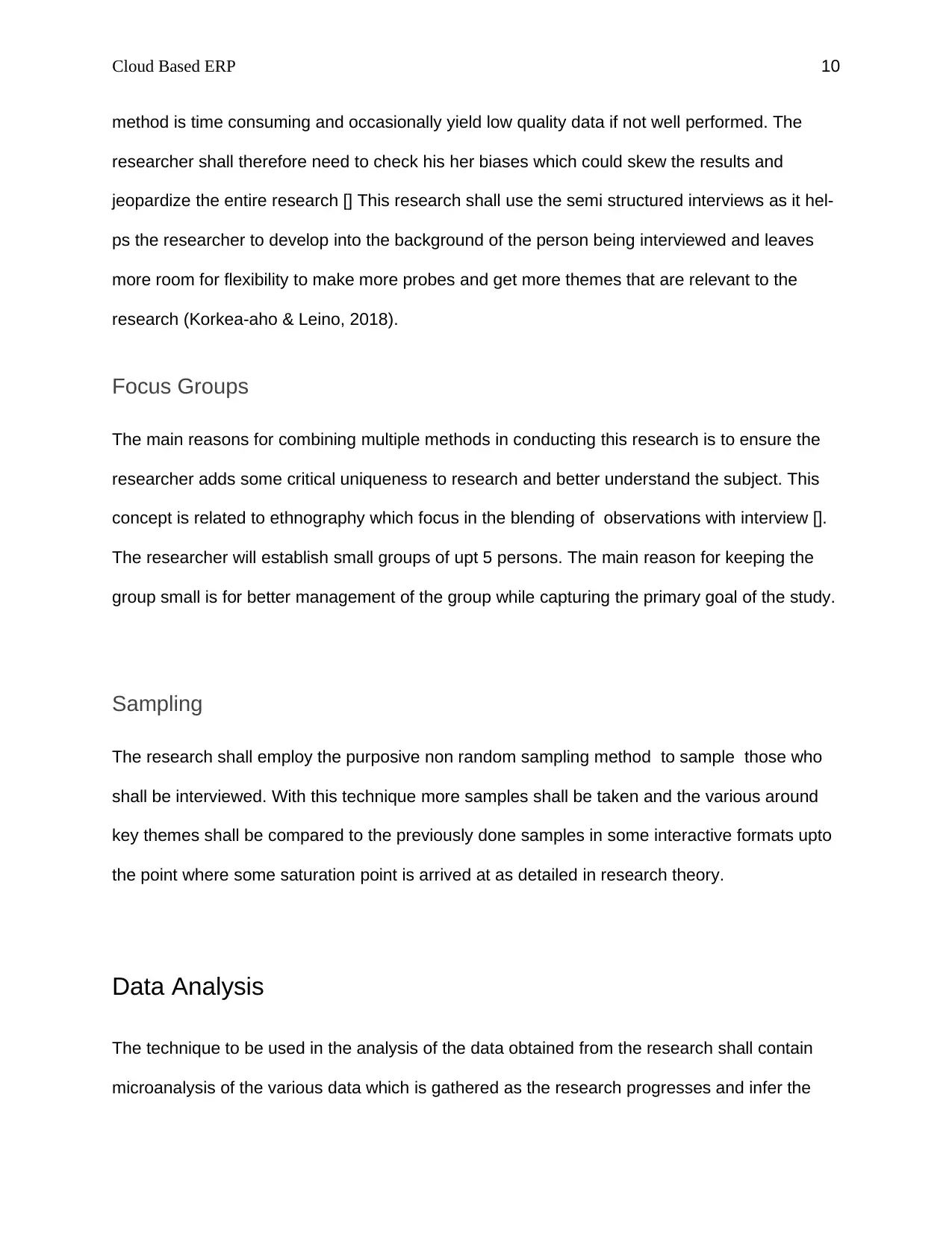
Cloud Based ERP 10
method is time consuming and occasionally yield low quality data if not well performed. The
researcher shall therefore need to check his her biases which could skew the results and
jeopardize the entire research [] This research shall use the semi structured interviews as it hel-
ps the researcher to develop into the background of the person being interviewed and leaves
more room for flexibility to make more probes and get more themes that are relevant to the
research (Korkea-aho & Leino, 2018).
Focus Groups
The main reasons for combining multiple methods in conducting this research is to ensure the
researcher adds some critical uniqueness to research and better understand the subject. This
concept is related to ethnography which focus in the blending of observations with interview [].
The researcher will establish small groups of upt 5 persons. The main reason for keeping the
group small is for better management of the group while capturing the primary goal of the study.
Sampling
The research shall employ the purposive non random sampling method to sample those who
shall be interviewed. With this technique more samples shall be taken and the various around
key themes shall be compared to the previously done samples in some interactive formats upto
the point where some saturation point is arrived at as detailed in research theory.
Data Analysis
The technique to be used in the analysis of the data obtained from the research shall contain
microanalysis of the various data which is gathered as the research progresses and infer the
method is time consuming and occasionally yield low quality data if not well performed. The
researcher shall therefore need to check his her biases which could skew the results and
jeopardize the entire research [] This research shall use the semi structured interviews as it hel-
ps the researcher to develop into the background of the person being interviewed and leaves
more room for flexibility to make more probes and get more themes that are relevant to the
research (Korkea-aho & Leino, 2018).
Focus Groups
The main reasons for combining multiple methods in conducting this research is to ensure the
researcher adds some critical uniqueness to research and better understand the subject. This
concept is related to ethnography which focus in the blending of observations with interview [].
The researcher will establish small groups of upt 5 persons. The main reason for keeping the
group small is for better management of the group while capturing the primary goal of the study.
Sampling
The research shall employ the purposive non random sampling method to sample those who
shall be interviewed. With this technique more samples shall be taken and the various around
key themes shall be compared to the previously done samples in some interactive formats upto
the point where some saturation point is arrived at as detailed in research theory.
Data Analysis
The technique to be used in the analysis of the data obtained from the research shall contain
microanalysis of the various data which is gathered as the research progresses and infer the
Paraphrase This Document
Need a fresh take? Get an instant paraphrase of this document with our AI Paraphraser
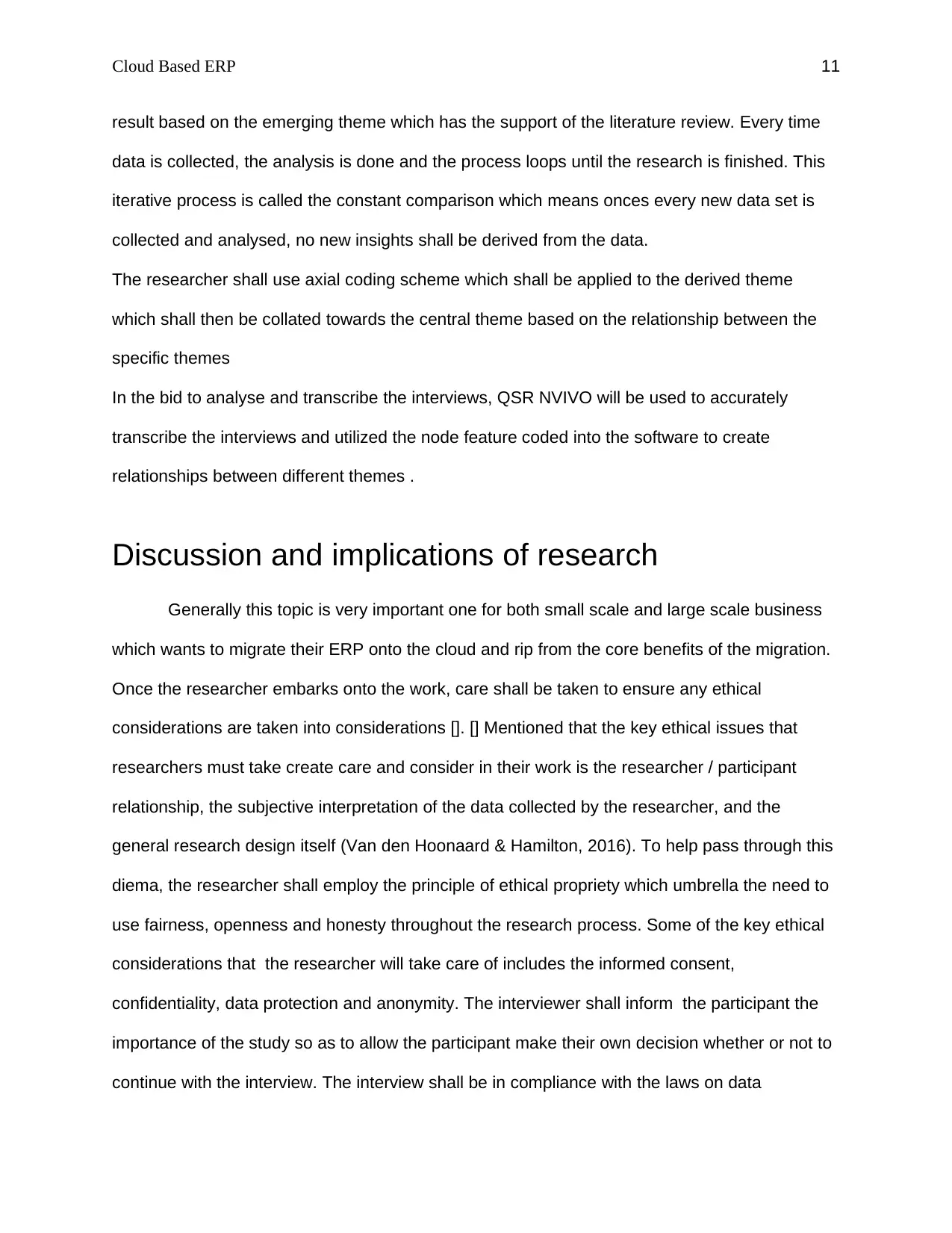
Cloud Based ERP 11
result based on the emerging theme which has the support of the literature review. Every time
data is collected, the analysis is done and the process loops until the research is finished. This
iterative process is called the constant comparison which means onces every new data set is
collected and analysed, no new insights shall be derived from the data.
The researcher shall use axial coding scheme which shall be applied to the derived theme
which shall then be collated towards the central theme based on the relationship between the
specific themes
In the bid to analyse and transcribe the interviews, QSR NVIVO will be used to accurately
transcribe the interviews and utilized the node feature coded into the software to create
relationships between different themes .
Discussion and implications of research
Generally this topic is very important one for both small scale and large scale business
which wants to migrate their ERP onto the cloud and rip from the core benefits of the migration.
Once the researcher embarks onto the work, care shall be taken to ensure any ethical
considerations are taken into considerations []. [] Mentioned that the key ethical issues that
researchers must take create care and consider in their work is the researcher / participant
relationship, the subjective interpretation of the data collected by the researcher, and the
general research design itself (Van den Hoonaard & Hamilton, 2016). To help pass through this
diema, the researcher shall employ the principle of ethical propriety which umbrella the need to
use fairness, openness and honesty throughout the research process. Some of the key ethical
considerations that the researcher will take care of includes the informed consent,
confidentiality, data protection and anonymity. The interviewer shall inform the participant the
importance of the study so as to allow the participant make their own decision whether or not to
continue with the interview. The interview shall be in compliance with the laws on data
result based on the emerging theme which has the support of the literature review. Every time
data is collected, the analysis is done and the process loops until the research is finished. This
iterative process is called the constant comparison which means onces every new data set is
collected and analysed, no new insights shall be derived from the data.
The researcher shall use axial coding scheme which shall be applied to the derived theme
which shall then be collated towards the central theme based on the relationship between the
specific themes
In the bid to analyse and transcribe the interviews, QSR NVIVO will be used to accurately
transcribe the interviews and utilized the node feature coded into the software to create
relationships between different themes .
Discussion and implications of research
Generally this topic is very important one for both small scale and large scale business
which wants to migrate their ERP onto the cloud and rip from the core benefits of the migration.
Once the researcher embarks onto the work, care shall be taken to ensure any ethical
considerations are taken into considerations []. [] Mentioned that the key ethical issues that
researchers must take create care and consider in their work is the researcher / participant
relationship, the subjective interpretation of the data collected by the researcher, and the
general research design itself (Van den Hoonaard & Hamilton, 2016). To help pass through this
diema, the researcher shall employ the principle of ethical propriety which umbrella the need to
use fairness, openness and honesty throughout the research process. Some of the key ethical
considerations that the researcher will take care of includes the informed consent,
confidentiality, data protection and anonymity. The interviewer shall inform the participant the
importance of the study so as to allow the participant make their own decision whether or not to
continue with the interview. The interview shall be in compliance with the laws on data
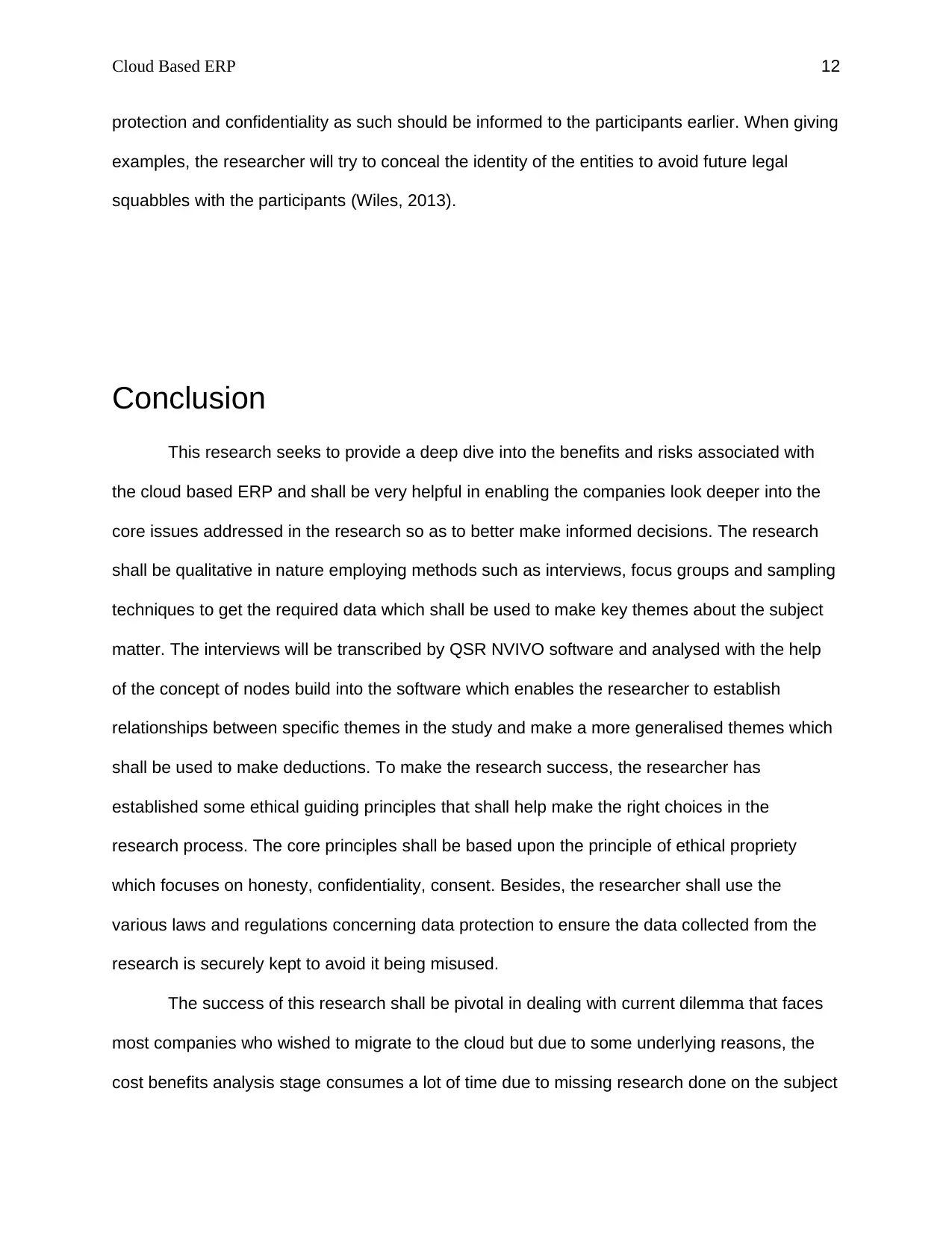
Cloud Based ERP 12
protection and confidentiality as such should be informed to the participants earlier. When giving
examples, the researcher will try to conceal the identity of the entities to avoid future legal
squabbles with the participants (Wiles, 2013).
Conclusion
This research seeks to provide a deep dive into the benefits and risks associated with
the cloud based ERP and shall be very helpful in enabling the companies look deeper into the
core issues addressed in the research so as to better make informed decisions. The research
shall be qualitative in nature employing methods such as interviews, focus groups and sampling
techniques to get the required data which shall be used to make key themes about the subject
matter. The interviews will be transcribed by QSR NVIVO software and analysed with the help
of the concept of nodes build into the software which enables the researcher to establish
relationships between specific themes in the study and make a more generalised themes which
shall be used to make deductions. To make the research success, the researcher has
established some ethical guiding principles that shall help make the right choices in the
research process. The core principles shall be based upon the principle of ethical propriety
which focuses on honesty, confidentiality, consent. Besides, the researcher shall use the
various laws and regulations concerning data protection to ensure the data collected from the
research is securely kept to avoid it being misused.
The success of this research shall be pivotal in dealing with current dilemma that faces
most companies who wished to migrate to the cloud but due to some underlying reasons, the
cost benefits analysis stage consumes a lot of time due to missing research done on the subject
protection and confidentiality as such should be informed to the participants earlier. When giving
examples, the researcher will try to conceal the identity of the entities to avoid future legal
squabbles with the participants (Wiles, 2013).
Conclusion
This research seeks to provide a deep dive into the benefits and risks associated with
the cloud based ERP and shall be very helpful in enabling the companies look deeper into the
core issues addressed in the research so as to better make informed decisions. The research
shall be qualitative in nature employing methods such as interviews, focus groups and sampling
techniques to get the required data which shall be used to make key themes about the subject
matter. The interviews will be transcribed by QSR NVIVO software and analysed with the help
of the concept of nodes build into the software which enables the researcher to establish
relationships between specific themes in the study and make a more generalised themes which
shall be used to make deductions. To make the research success, the researcher has
established some ethical guiding principles that shall help make the right choices in the
research process. The core principles shall be based upon the principle of ethical propriety
which focuses on honesty, confidentiality, consent. Besides, the researcher shall use the
various laws and regulations concerning data protection to ensure the data collected from the
research is securely kept to avoid it being misused.
The success of this research shall be pivotal in dealing with current dilemma that faces
most companies who wished to migrate to the cloud but due to some underlying reasons, the
cost benefits analysis stage consumes a lot of time due to missing research done on the subject
⊘ This is a preview!⊘
Do you want full access?
Subscribe today to unlock all pages.

Trusted by 1+ million students worldwide
1 out of 15
Related Documents
Your All-in-One AI-Powered Toolkit for Academic Success.
+13062052269
info@desklib.com
Available 24*7 on WhatsApp / Email
![[object Object]](/_next/static/media/star-bottom.7253800d.svg)
Unlock your academic potential
Copyright © 2020–2026 A2Z Services. All Rights Reserved. Developed and managed by ZUCOL.





